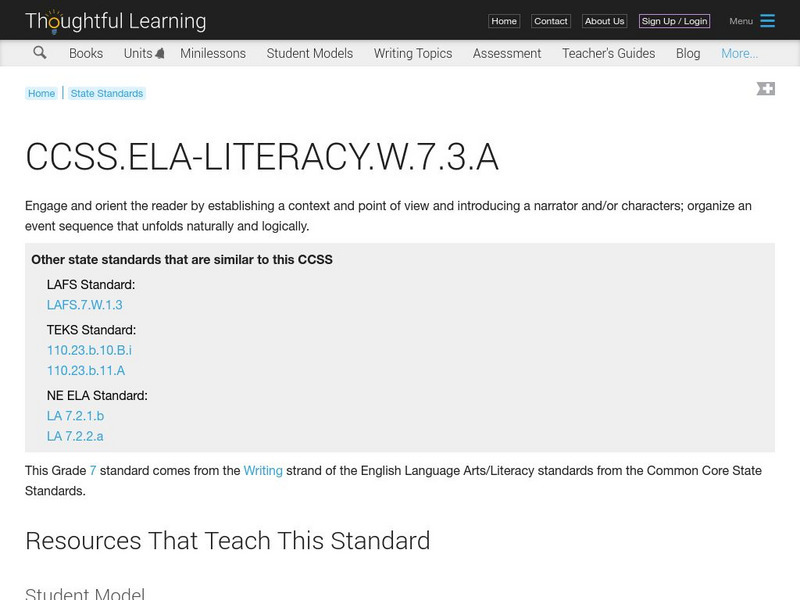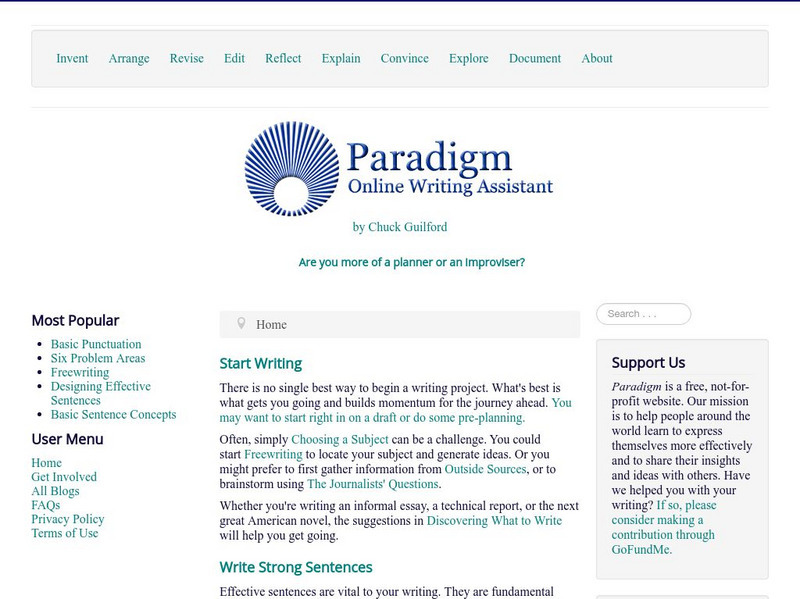Hi, what do you want to do?
Curated OER
Microbial Contaminants in Drinking Water
When presented with three unopened bottles of water, high schoolers are asked to tell decide which one is contaminated with a microbe. Students work in small groups and role play being a Microbiologist, a patient, or a recorder. The...
Curated OER
Graphing Pockets
Second graders explore graphing. They count the number of pockets on their clothes and use Microsoft Excel to enter their data. Students create a class graph displaying their findings.
Curated OER
Stick To The Topic
Second graders engage in a lesson that is concerned with the increase of writing conventions. The teacher models the writing process for the students. The students work with the teacher to create a shared writing piece before the work...
Curated OER
Conducting Research
Fourth graders write informational research reports. They are given a worksheet on conducting research. Students are told that they are going to write a research report about trains. They review the list of trains and discuss how each...
Curated OER
New Hampshire Unplugged
Students define technology and how it is used. They give a personal account of how technology has affected people and in what ways they have used technology. Students compare the technology of today with technology used in one era of...
Curated OER
Trumpet of the Swan Graphic Organizer
In this literature worksheet, students use this graphic organizer to list details about the book Trumpet of the Swan. The title is in the center of the circle and there are 8 lines coming out of it which students can use to write details.
Curated OER
Piecing Together the Puzzle
Students examine tikkun olam. In this religion lesson, students define the concept of tikkun olam and identify actions that they can do to help make the "perfect world." Students share ideas and post their ideas on the class web.
Curated OER
Comparing The Hobbit and The Fellowship of the Ring
Students write an essay comparing The Hobbit to The Fellowship of the Ring by J.R.R. Tolkien. In this The Hobbit and The Fellowship of the Ring lesson, students compare the plot, theme, writing styles, and other elements in the two books.
Curated OER
Egyptian Dynasties
Sixth graders read the chapters in their social studies books and answer questions about Egyptian Dynasties. In this Egyptian Dynasties lesson plan, 6th graders research in their book, and then work in groups to answer the questions.
Curated OER
Rootbeer Writing
Students utilize IBC Rootbeer, to make introductions, bodies, and conclusions within the paper become more delightful.
Curated OER
Identifying Science Fiction
Students discuss works of science fiction that they read, highlight aspects that made each a part of science fiction genre, identify formal literary elements, and discuss ways each can be developed through science fiction.
Grammarly
Grammarly Handbook: Organize Your Thoughts in Patterns
Tips on organizing ideas in an essay.
Louisiana Department of Education
Louisiana Doe: Louisiana Believes: Ela Guidebooks: Organizational Frames for Writing
This strategy helps students prepare and organize thoughts about text, develop a written response in the form of a short or extended response, and use standard English grammar, usage, and conventions in writing.
ReadWriteThink
Read Write Think: Seed Discussion Organizer
A printable graphic organizer students can use to organize their thoughts when a new concept is introduced. Seed Discussion categories include things the learner does not understand, things that are surprising or interesting, new...
Other
Thoughtful Learning: ccss.ela literacy.w.7.3.a
Pick and choose from these lessons and units that focus on narrative writing. Specifically, how to establish a context and point of view, introduce characters, and organize an event sequence.
Sophia Learning
Sophia: Forming an Opinion
This lesson will help prepare students to first form an opinion and then provide a correctly written response. Students organize their thoughts, agree or disagree, define the problem, support opinion, and conclude in 3-5 sentences. This...
Boise State University
Paradigm Online Writing Assistant
This online writing assistance offers help in the writing process, grammar and mechanics, usage, and four different types of essays, as well as help on deciding what and how to document.
Sophia Learning
Sophia: Paper Writing (I Just Got Assigned a Paper. Now What?)
Work through the writing process by following these ten easy steps. The site also provides tips on brainstorming to generate ideas and using Venn diagrams to organize thoughts.
AdLit
Ad lit.org: Classroom Strategies: Inquiry Charts (I Charts)
The Inquiry Chart (I-Chart) is a strategy that enables students to generate meaningful questions about a topic and organize their writing. Students integrate prior knowledge or thoughts about the topic with additional information found...
Discovery Education
Discovery Education: Science Fair Central
Are you, your students, and their parents wandering lost in the Science Fair desert? Here's an oasis! The Science Fair Central website provides a complete guide to the topic. There's a "Soup to Nuts Handbook" that assists the student in...
Other
Kim's Korner: Six Trait Analytic Writing Model
Check out this comprehensive website featuring ideas for teaching writing based on the six trait analytic writing model.
Other
Northwest Regional Educational Laboratory: 6+1 Traits
This site focuses on the 6+1 TraitTM Writing framework.
Other
Northwest Regional Educational Laboratory: 6+1 Traits
This site focuses on the 6+1 TraitTM Writing framework.
Sophia Learning
Sophia: I Just Got Assigned a Paper, Now What?
This lesson focuses on what to do after being assigned a paper; it provides the basic steps to writing a paper: brainstorm topics, organize your thoughts (Venn diagrams, tree diagram examples), conduct preliminary research, create a...


























